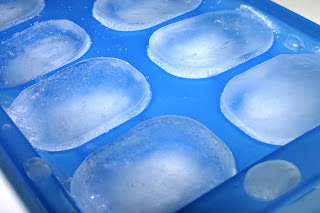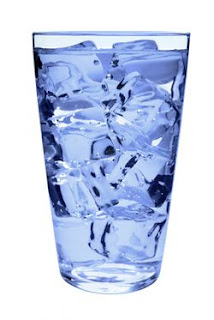Does drinking ice water burn calories?
For anyone trying to lose weight, this question is an exciting one! If you simply want to know if your body burns calories warming up the water, the answer is yes. But if you want to know if drinking a lot of ice water can help you lose weight, or keep weight off, this "yes" needs to be qualified with some calculations.
First of all, calories are case-sensitive. There are calories and then there are Calories. Calories with a big "c" are the ones used to describe the amount of energy contained in foods. A calorie with a little "c" is defined as the amount of energy it takes to raise the temperature of 1 gram of water 1 degree Celsius.
What most people think of as a Calorie is actually a kilo-calorie: It takes one Calorie to raise the temperature of 1 kilogram of water 1 degree Celsius. So when you drink a 140-Calorie can of cola, you are ingesting 140,000 calories. There is no cause for alarm, because the conversion applies across the board. When you burn 100 Calories jogging a mile, you are burning 100,000 calories.
So, considering that the definition of a calorie is based on raising the temperature of water, it is safe to say that your body burns calories when it has to raise the temperature of ice water to your body temperature. And unless your urine is coming out ice cold, your body must be raising the temperature of the water. So calories are being burned.
Let's figure out exactly what you're burning when you drink a 16-ounce (0.5 liter) glass of ice water:
- The temperature of ice water can be estimated at zero degrees Celsius.
- Body temperature can be estimated at 37 degrees Celsius.
- It takes 1 calorie to raise 1 gram of water 1 degree Celsius.
- There are 473.18 grams in 16 fluid ounces of water.
So in the case of a 16-ounce glass of ice water, your body must raise the temperature of 473.18 grams of water from zero to 37 degrees C. In doing so, your body burns 17,508 calories. But that's calories with a little "c." Your body only burns 17.5 Calories, and in the grand scheme of a 2,000-Calorie diet, that 17.5 isn't very significant.
But let's say you adhere to the "eight 8-ounce glasses of water a day" nutritional recommendation. In 64 ounces of water, there are 1,892.72 grams. So to warm up all that water in the course of a day, your body burns 70,030 calories, or 70 Calories. And over time, that 70 Calories a day adds up. So, while you definitely shouldn't depend on ice water consumption to replace exercise or a healthy diet, drinking cold water instead of warm water does, in fact, burn some extra Calories!
What is the relation between Ice Water and Digestion ?
Some people may have heard that you should not drink ice water with a meal. If they have heard this, many are unsure of the reasoning behind this information. Many other people have never even heard that drinking ice water, or other cold drinks, with their meal can be detrimental to their digestion. In this article, we will explain the reasons behind why your digestion could suffer from your intake of cold beverages.
The Chinese were the first to know and understand that drinking ice water with a meal could harm your digestion. They have, for many years, chosen to instead drink warm or hot beverages, such as water and tea, with their meals.
Not being able to properly digest your food can be harmful to you in many different ways. Your body must turn the food you consume into energy in order for your organs to function properly and give you the energy you need to perform your daily tasks. Also, your body retrieves essential vitamins and minerals from the food you eat. If your body cannot work properly to retrieve these elements, it will suffer. Your immune system, which works to fight off colds and other illnesses, can also suffer from poor digestion because it does not have the energy it needs to function correctly.
Ice water can be harmful because it damages your body's ability to properly digest food and drink. Drinking cold beverages with a meal can slow down your body's proper digestive actions. You can think of it as almost freezing your insides temporarily so that they cannot do what they need to do at that moment. So, instead, food goes by improperly digested, and your body's unable to retrieve the nutrients and energy from it that it needs. By decreasing the activity of your digestive system, cold beverages rob you of the nutrition of the food you ate.
Also, when you drink cold beverages, your body has to use energy in order to warm up that liquid inside your body. This is also robbing your body of the energy it needs to properly process the food you have eaten. Instead of working to get all the nutrition of the food, your digestive system is instead working on regulating the temperature of the cold drink.
Instead of ice water or other iced beverages, you should opt for room temperature drinks or even warmer liquids, such as hot water or hot tea. Do not drink beverages straight out of the refrigerator. If a beverage must stay chilled in order to keep, make sure your pour a glass and then wait until it has warmed to room temperature before drinking. When you are in a restaurant, be sure you tell your waiter to hold the ice.
Drinking warmer liquids will aid your digestive system by increasing its activity. This will, in return, allow your body to absorb the proper amount of energy and nutrition from the foods you consumed.
Is Chewing Ice Bad for You?
Almost everyone knows someone who is addicted to chewing ice. They crunch on ice cubes all day long. They get up in the middle of the night to chew ice. They have favourite ice cube trays and go out of their way to get ice from specific places. They literally go crazy if they can’t get ice. Maybe you’re one of them.
Ice chewing is called pagophagia, and it’s one specific type of a more general medical condition that’s referred to as pica. People with pica have a compulsive desire to eat things that have no nutritional value, such as ice or cornstarch, or even things that aren’t food at all, like clay, dirt, chalk, or paint chips. Compared with gnawing on pencil erasers or peeling the paint off the baseboards, chewing on a little ice doesn’t seem all that bad, does it? Nonetheless, it can signal a medical problem.
As with other forms of pica, the compulsion to chew ice is often a sign of severe iron deficiency. That’s probably why so many women report developing an ice-chewing habit during pregnancy. Because iron needs are very high during pregnancy, pregnant women commonly develop iron deficiency anaemia.
Another group of people that are at high risk of iron and other nutrient deficiencies are those who have had gastric bypass surgery. Because the size of the stomach is so drastically reduced by this surgery, patients can eat only very small amounts of food, which obviously limits the amount of nutrients they can take in. Plus, their ability to digest food and absorb nutrients is greatly impaired. That, by the way, is just one reason why I believe that gastric bypass should be used only as a last resort and accompanied by much more intensive nutritional therapy and support than it usually is.
Some people say that when you have a craving for a certain food, it’s a sign that your body needs the nutrients in that food. But ice is not a good source of iron or other nutrients. So, although chewing ice isn’t likely to causeanemia, it’s certainly not going to cure it, either. Another reason that you might be attracted to ice chewing if you’re anaemic is that anaemia can make your tongue and gums sore or cause a burning sensation in your mouth, which chewing ice can help to relieve.
If you’re a compulsive ice chewer, it is highly likely that you are suffering from iron deficiency anaemia. It’s vitally important to check with your doctor to see whether you might need treatment for that. Many people find that once they correct the iron deficiency, the craving for ice goes away. Other medical conditions or medications can cause dry mouth so if you chew ice because your mouth always feels dry, check with your doctor about that too.
But chewing ice can also simply be a habit. People start chewing ice to relieve a dry mouth or out of boredom or to relieve stress or to quell the urge to snack, and over time it develops into a habit… or even a compulsion. Treating compulsive behaviour disorders is obviously outside my purview as a nutritionist. If any habit or behaviour starts to seriously interfere with your peace of mind or your ability to lead a happy, productive life, you’d probably want to consult a mental health professional.
But if you’ve ruled out underlying medical problems and your ice chewing habit isn’t threatening your relationships or your way of life, is there any harm in ice chewing? As I’ve talked about before, the idea that chewing ice or drinking iced beverages can damage your gastrointestinal tract or give you stomach cancer is a myth. It will not dilute your stomach acid or interfere with digestion. As long as you’re not chewing on ice to the exclusion of nutritious foods, it’s unlikely to lead to any nutritional problems. In fact, as I mentioned before, drinking water or chewing ice is sometimes used as a tool to prevent over-eating both by keeping your mouth busy and by taking up stomach space that you might otherwise be tempted to fill up with donuts.
Chewing ice can crack your teeth, however—which can get expensive. And it can annoy the living daylights out of the guy in the next cubicle at work…or the one sitting next to you on the couch at home
So, still want to have this ??!!.. :)
Source :
health.howstuffworks.comnutritiondiva.quickanddirtytips.com
fitday.com
**************************************
Melaka Planetarium Adventure Science Centre







0 comments:
Post a Comment